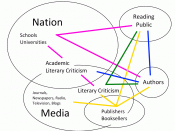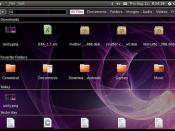The Beginning's of Literary Study - For Dummies J A Modified Version of R. L. McGuire's Passionate Attention: an introduction to literary study.
Literature and criticism Authors basic assumption of a book- the reading and the study of literature cannot and do not take place outside the context of human values.
One's unique personal experiences are from whence their values are formed. These values come to light as a reader reads or a writer writes.
Literature is a record of specific personal perceptions: H. Read-"the outer image of inward things".
Literature proves the richness not the limitations of being human.
Literary criticism is discernment-the ability to see.
The student needs to form their own critical criteria and offer an interpretation of the work based on those criteria.
Judgmental reviewing is narrow and only one aspect of literary criticism. The value of criticism is not that it lays down laws that any reader must follow, but that it offers a new way of seeing a literary work, which may not have been possible to the reader.
For example in the critical analysis of a poem the reader might look for the connections between words, stanzas, structure and ideas.
The four basic approaches to literary criticism are: 1) the mimetic 2) the pragmatic 3) the expressive 4) the objective Mimetic approach- describes the relationship of the literary work to the world or the universe in which the work was conceived or being read.
Pragmatic approach- describes the effects of the work on its audience.
Expressive approach- proposes the study of the relationship of the work to the writer: biographical, psychological, history, culture.
Objective approach- is that which studies the work in and for itself without reference to the world in which it exists, its effect on its readers, or the works relationship...


